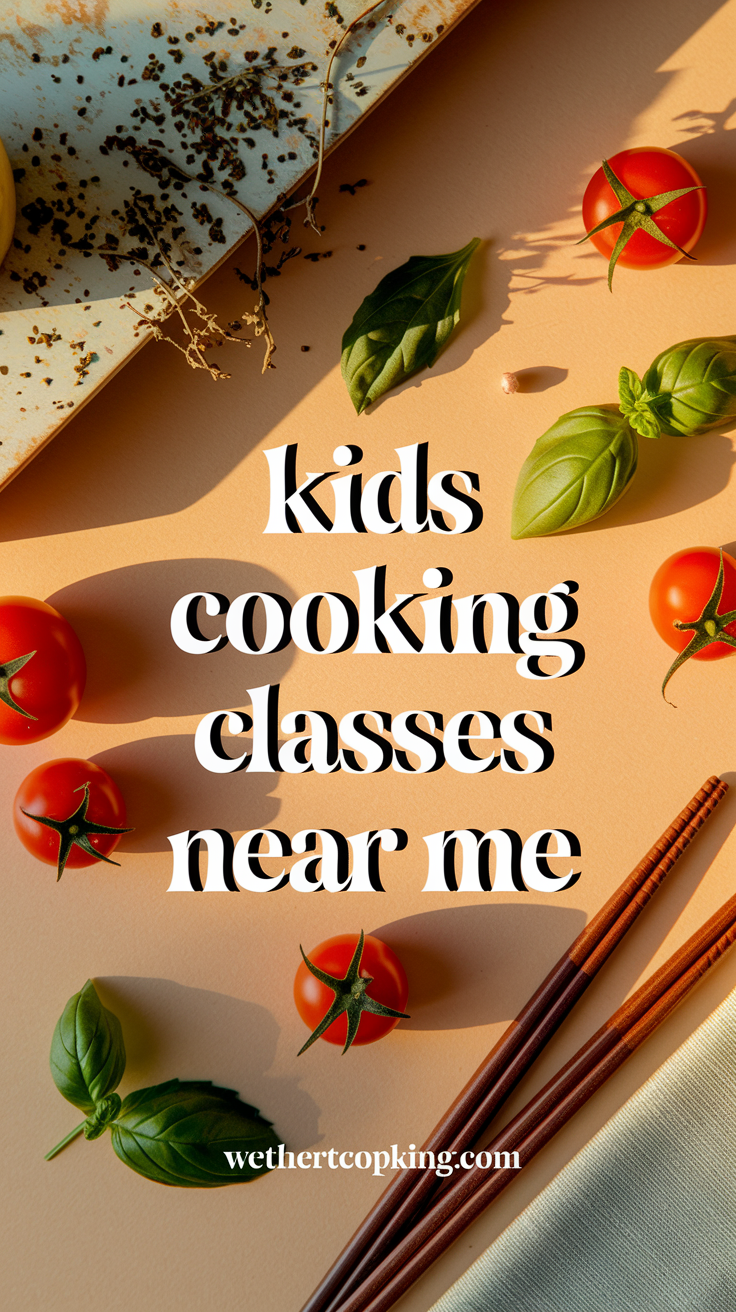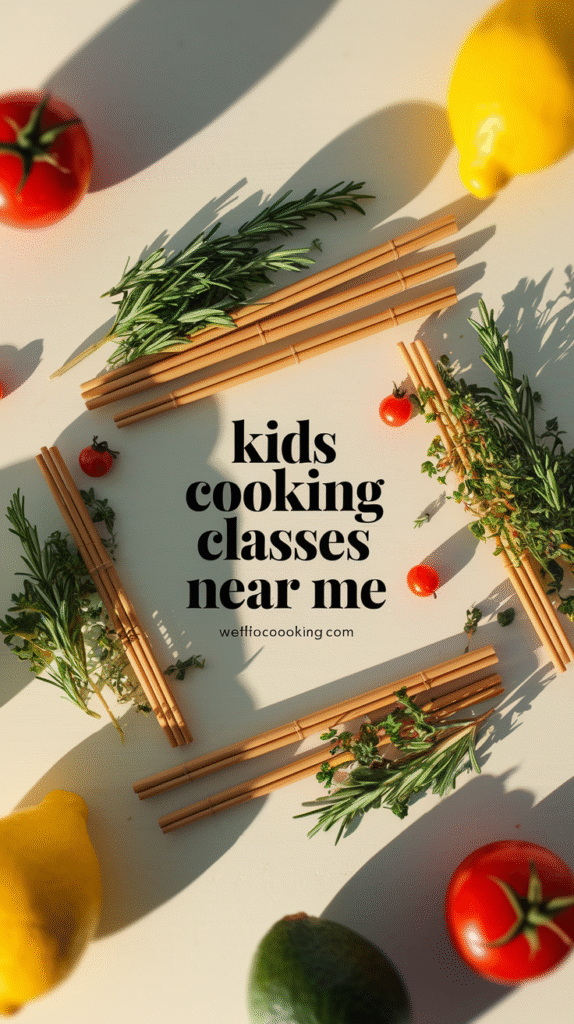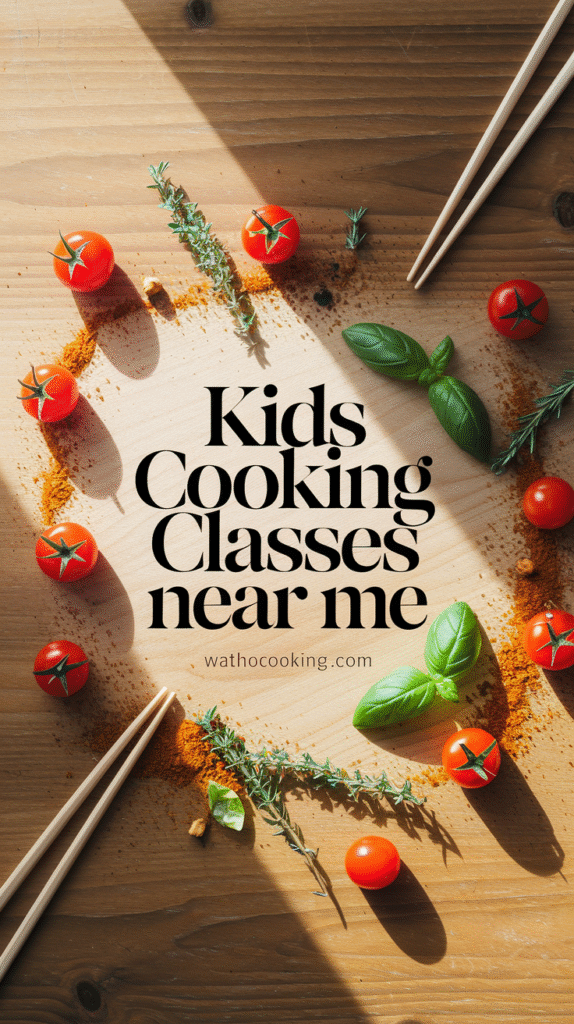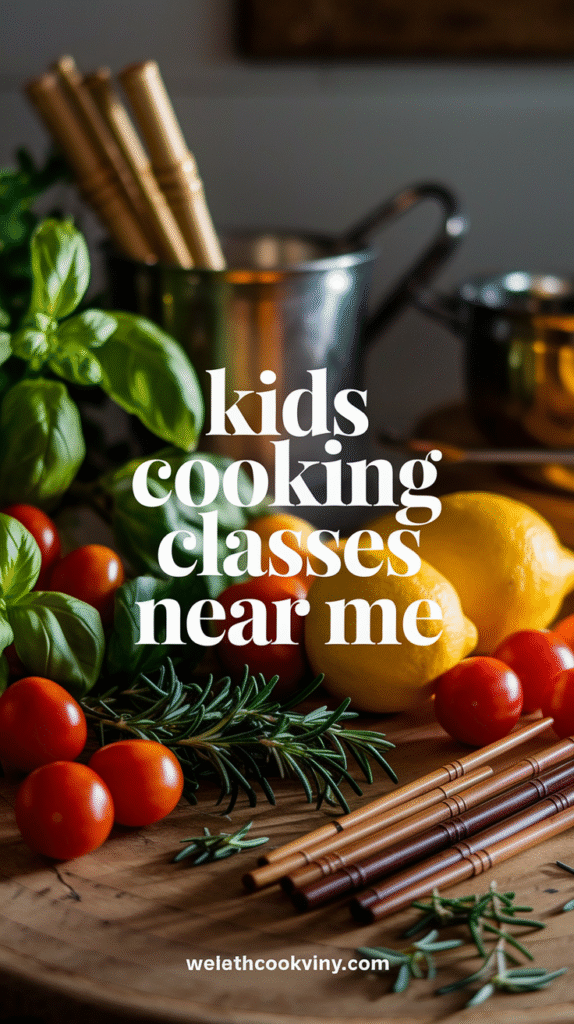Are your little ones showing interest in the kitchen? Finding local “kids cooking classes near me” can be a fantastic way to nurture this budding passion. Cooking classes designed for children not only teach essential culinary skills but also promote teamwork, creativity, and confidence. Here’s how you can explore the best options available nearby for your child.
Benefits of Kids Cooking Classes
Kids cooking classes offer several benefits that go beyond just making a meal. Here are a few key advantages:
- Skill Development: Children learn vital cooking techniques, including chopping, mixing, and measuring.
- Healthy Eating: Classes often focus on nutritious meals, encouraging kids to enjoy fruits, vegetables, and whole foods.
- Social Skills: Cooking with peers helps children develop teamwork, communication, and leadership skills.
- Creativity: Kids can experiment with flavors and presentation, boosting their creative thinking.
Factors to Consider When Choosing a Class
When searching for kids cooking classes near you, it’s essential to consider several factors to ensure a great fit:
- Age Appropriateness: Look for classes specifically designed for your child’s age group. Different age ranges may have different skill sets and interests.
- Class Size: Smaller class sizes often allow for more individualized attention, ensuring your child receives proper guidance and support.
- Curriculum: Different classes focus on various aspects of cooking. Some may center on baking, while others might explore international cuisines. Review the curriculum to find what excites your child.
- Location: Consider the travel distance. Choosing a nearby culinary school or community center can make it easier for you and your child.
- Cost: Compare the prices of different classes. Some may offer discounts for multiple sessions or family rates.
Where to Find Local Classes
To discover “kids cooking classes near me,” consider these resources:
- Cooking with Kids: This organization offers insight into various programs that promote cooking among children.
- Kids Cooking Classes: This resource provides a comprehensive list of classes available based on location.
- Local Cooking Classes: A platform where you can search cooking classes tailored to kids in your area.
Types of Classes Available
There is a wide variety of cooking classes available for kids. Understanding these options can help you decide what suits your child best:
| Type of Class | Description |
|---|---|
| Baking Classes | Focus on pastries, cakes, and bread, teaching measuring, mixing, and decorating. |
| International Cuisine | Introduce kids to the flavors of different cultures, allowing exploration of unique recipes and ingredients. |
| Healthy Eating Workshops | Emphasize nutrition and meal-planning, encouraging kids to make healthy food choices. |
| Seasonal Cooking | Utilize seasonal ingredients, teaching children about the importance of fresh produce. |
How to Prepare Your Child for Cooking Classes
Once you’ve chosen a cooking class, preparing your child can enhance their experience:
- Talk about Expectations: Discuss what they will learn and what the class will involve, alleviating any anxieties.
- Foster Enthusiasm: Encourage excitement by involving them in choosing recipes or ingredients.
- Dress Appropriately: Ensure they wear comfortable clothes suitable for cooking, preferably with closed shoes.
Finding “kids cooking classes near me” can be an enjoyable adventure for both you and your child. With numerous options available, you can discover the perfect fit that matches your child’s interests and skills. Embrace this opportunity to create lasting memories in the kitchen and foster a love for cooking that they will carry into adulthood.
The Benefits of Enrolling Your Child in Cooking Classes
Enrolling your child in cooking classes can offer a variety of benefits that go beyond just learning to make delicious meals. It can be an enriching experience that helps your child grow in numerous ways. Let’s explore some of the most significant advantages of cooking classes for kids.
Life Skills Development
Cooking is a vital skill that fosters independence. By learning how to cook, children develop the ability to prepare their own meals, which can be empowering. Through cooking classes, kids can acquire numerous life skills, including:
- Meal Planning: Understanding how to plan meals can lead to healthier eating choices.
- Time Management: They learn to manage their time effectively by juggling tasks such as chopping, cooking, and cleaning.
- Organization: Keeping a tidy workspace is essential when preparing food, teaching kids to stay organized.
Boosts Creativity
Cooking is an art that encourages creative thinking. Kids can experiment with different ingredients, flavors, and presentation techniques. Cooking classes often emphasize creativity, providing children with the freedom to explore their culinary skills. This creative outlet can boost their confidence and encourage them to think outside the box.
Nutrition Education
Understanding nutrition is essential for a healthy lifestyle. Cooking classes often teaches children about balanced diets and the nutritional value of various ingredients. By learning how to cook with whole foods, kids are more likely to appreciate healthy eating habits. This knowledge can shape their choices as they grow older.
Social Interaction
Cooking classes provide a unique opportunity for children to interact with their peers. They work together, share ideas, and learn collaboration in a fun environment. This social aspect can help build friendships and improve communication skills. Engaging in group cooking activities fosters teamwork, which is an essential skill in both school and life.
Improves Mathematical Skills
Cooking involves a lot of measuring, weighing, and timing, all of which require mathematical skills. Kids who engage in cooking classes practice basic math concepts such as:
- Fractions: Understanding and using fractions are common in recipes.
- Measurement: Accurately measuring ingredients helps improve their understanding of volume and weight.
- Time Management: They learn to manage cooking times, enhancing their time-reading skills.
Enhances Cultural Awareness
Cooking is a window to cultures around the world. Many cooking classes introduce children to international cuisines, which can enhance their cultural awareness. Learning to cook different dishes helps them appreciate diversity and understand various traditions. This exposure can lead to more open-mindedness and curiosity about the world.
Emotional Benefits
Cooking can be therapeutic and help channel emotions positively. Kids may find joy and satisfaction in preparing their meals. The sense of accomplishment they get when they create something delicious can boost self-esteem. Additionally, cooking can serve as a stress-reliever, providing a break from academic pressures.
The benefits of enrolling your child in cooking classes extend far beyond just culinary skills. From boosting creativity and enhancing social skills to promoting nutrition education and cultural awareness, cooking classes can play a significant role in your child’s development. If you’re interested in finding “kids cooking classes near me,” consider checking out local cooking schools or community centers. For more information and finding classes near your area, you can visit Kids Cook or Cooking with Kids for dedicated programs designed specifically for children.
Try to involve your child in the kitchen today—who knows, they might discover a lifelong passion for cooking! Enroll them in cooking classes for a comprehensive learning experience that will yield countless benefits in their lives.
Fun and Creative Recipes Often Taught in Kids Cooking Classes
Kids cooking classes are a fantastic way for children to explore their creativity while learning essential cooking skills. These fun and engaging classes not only teach kids how to prepare delicious meals but also encourage them to try new ingredients and flavors. Here are some popular and creative recipes often taught in kids cooking classes that can inspire your child’s culinary adventures.
Colorful Fruit Skewers
Fruit skewers are a simple yet delightful recipe that kids love to make. This dish is perfect for teaching kids about different types of fruits while reinforcing the importance of healthy eating. In a cooking class, kids might learn to:
- Select a variety of colorful fruits such as strawberries, blueberries, bananas, and pineapples.
- Cut the fruit into bite-sized pieces (with appropriate safety measures).
- Assemble the fruits on skewers in a fun and creative pattern.
This activity enhances fine motor skills and allows children to express their artistic side while making a tasty snack!
Mini Pizzas
Making mini pizzas is another exciting recipe often featured in kids cooking classes. Children can customize their pizzas, which encourages creativity and personal expression.
Typically, the process includes:
- Choosing different bases like pita bread, English muffins, or pre-made dough.
- Spreading pizza sauce over their chosen base.
- Selecting toppings such as cheese, pepperoni, vegetables, and more.
Not only does this recipe teach kids about basic cooking techniques, but it also introduces them to concepts like balance in nutrition and flavors.
No-Bake Energy Bites
No-bake energy bites are a fantastic recipe for introducing young chefs to the world of healthy snacks. These simple treats can be made with minimal adult supervision, making them perfect for kids. The main steps include:
- Mixing together rolled oats, nut butter, honey, and chocolate chips.
- Forming the mixture into small balls.
- Chilling them in the refrigerator until set.
These energy bites are not only tasty but also nutritious, providing a great alternative to sugary snacks!
Decorative Cupcakes
Kids cooking classes often include cake decorating sessions that revolve around making decorative cupcakes. This recipe teaches younger chefs about baking while allowing for creativity in decoration. Key aspects include:
- Baking cupcakes from scratch or using a box mix.
- Learning how to make different types of frosting, such as buttercream and cream cheese.
- Using various tools like piping bags to create beautiful designs.
Children love being able to showcase their creations at parties or family gatherings!
Homemade Pasta
Making homemade pasta might sound intimidating, but it’s a fun and educational recipe for kids in cooking classes! This recipe teaches them various techniques, including:
- Kneading the dough made from flour and eggs.
- Rolling out the dough with a rolling pin or pasta machine.
- Cutting the dough into shapes like fettuccine or ravioli.
Homemade pasta is a time-consuming but rewarding dish that encourages kids to appreciate the effort behind delicious food.
Fruit Smoothies
Fruit smoothies provide a quick and healthy treat that kids can easily make. This recipe combine nutrition with fun and creativity. Kids learn to:
- Choose a variety of fruits, such as bananas, berries, and mangoes.
- Add yogurt or milk for creaminess.
- Blend all the ingredients until smooth and pour into fun cups.
Making smoothies also provides a great opportunity for kids to explore different flavor combinations and textures.
Cooking Class Resources
If you’re interested in finding kids cooking classes near you or online, check out these fantastic resources:
Exploring these fun and creative recipes in kids cooking classes will not only enhance your child’s culinary skills but also foster a love for cooking and healthy eating that lasts a lifetime!
How Cooking Classes Can Enhance Your Child’s Life Skills
Cooking classes for kids are more than just a fun way to spend time in the kitchen. They equip children with essential life skills that serve them well throughout their lives. When you search for “kids cooking classes near me,” you open the door for your child to learn valuable lessons while enjoying hands-on activities.
Learning to cook fosters independence in children. As they master various recipes, they gain confidence in their abilities. This independence can be incredibly empowering, leading to a sense of accomplishment. Preparing their meals teaches kids that they can create delicious dishes and feel proud of what they achieve.
Another significant benefit of cooking classes is the opportunity for teamwork. Working with peers in a group setting teaches children how to collaborate and communicate effectively. Kids learn to share responsibilities and agree on decisions, providing them with essential social skills. In these classes, they often find friends who share similar interests, which enhances their enjoyment of the learning process.
Cooking also encourages creativity. When children experiment with flavors, colors, and textures, they tap into their imaginative side. A cooking class might challenge them to come up with a unique dish using a set of given ingredients, pushing their creative boundaries and fostering innovative thinking. This skill translates well into many areas of life, including academics and hobbies.
In addition to creativity, cooking classes provide a valuable lesson in time management. Children must learn how to plan and execute a dish within a specific timeframe. This process requires them to organize their tasks efficiently, making sure that ingredients are prepped, cooked, and served in an orderly manner. Mastering time management at a young age will benefit them as they grow and face more complex challenges.
Moreover, cooking classes can improve mathematical skills. Measuring ingredients, doubling recipes, or adjusting cooking times all require basic math. Kids unconsciously practice addition, subtraction, fractions, and ratios while cooking. The practical application makes math more interesting and relevant, allowing them to see its real-world value.
Following a recipe can also aid in reading comprehension. Children learn to read and understand instructions, which is an essential skill in all areas of learning. As they follow steps to create dishes, they develop the ability to process information in a structured way. This skill can extend beyond the kitchen to their schoolwork, improving overall academic performance.
Health and nutrition education is another critical component of cooking classes. Kids learn about different food groups, the importance of balanced meals, and how to make healthier choices. This knowledge can lead to lifelong habits that promote better health. Understanding nutrition can also empower children to appreciate where their food comes from, whether it’s from a garden or the grocery store.
| Life Skill | Description |
|---|---|
| Independence | Empowers children to prepare their meals, boosting self-confidence. |
| Teamwork | Encourages collaboration and communication with peers. |
| Creativity | Fosters imagination through experimenting with flavors and presentations. |
| Time Management | Teaches children to organize and manage tasks efficiently. |
| Math Skills | Encourages practical application of basic math through cooking tasks. |
| Reading Comprehension | Improves ability to follow written instructions and comprehend information. |
| Health & Nutrition | Educates about balanced meals and making healthy choices. |
Finding the right cooking classes for your child can be a straightforward process. Many local community centers, cooking schools, or even online platforms provide classes specifically tailored for kids. This lets children dive into the world of cooking while developing vital skills. Leverage your search for “kids cooking classes near me” to discover nearby options such as The Cooking Studio or Raddish Kids, which are both dedicated to enriching children’s culinary experiences.
Ultimately, enrolling your child in cooking classes will enrich their life skills while establishing a love for food and cooking. As they learn to prepare meals, they gain confidence, creativity, and valuable practical knowledge that will benefit them in countless ways. Embracing the adventure of cooking together can also be an excellent opportunity for family bonding, allowing you to share in the joy and rewards of your child’s culinary pursuits.
Engaging with Your Child: Cooking Together at Home Inspired by Classes
Cooking with your child can be a delightful way to bond while teaching them essential skills. After attending kids’ cooking classes near you, bring that excitement home and replicate the learning experience. Here’s how you can engage with your child in the kitchen, inspired by lessons they may have learned in class.
Discovering New Recipes Together
Start by selecting a recipe you think your child would enjoy. Whether it’s a simple pasta dish or homemade pizza, make the process interactive:
- Involve Your Child in Selection: Let them choose from a few options. This will spark their interest and give them a sense of ownership.
- Gather Ingredients: Turn shopping for ingredients into an adventure. Explore local markets or grocery stores together to find fresh produce.
- Prep Work: Teach them how to wash, measure, and chop ingredients (depending on their age). This enhances their confidence in the kitchen.
The Cooking Process
As you dive into cooking, emphasize the importance of teamwork. Assign them age-appropriate tasks while you manage the more complex steps:
- Mixing and Stirring: Kids love to mix ingredients. Let them take charge of combining items in a bowl.
- Setting the Table: While dinner cooks, engage them in setting the table. This is a vital part of mealtime etiquette.
- Tasting: Encourage them to taste as they cook. This helps develop their palates and makes the process more enjoyable.
Engagement Through Education
Use cooking as an opportunity to teach valuable life skills:
- Math Skills: Measuring ingredients is a fun way for kids to practice their math skills. Discuss fractions and volumes while using measuring cups.
- Science Principles: Explain the science behind cooking, like how heat changes food or why yeast causes bread to rise.
- Cultural Awareness: Research the origins of the recipe chosen. Cooking can be a gateway to learning about different cultures and traditions.
Making It Fun
Add a playful touch to your cooking sessions. Use colorful ingredients, create fun shapes with food, or have a themed dinner night.
Incorporate games like cooking challenges or timers to see how quickly you can prepare a meal. You could even set up a small competition to make it even more exciting!
Reflecting on Your Cooking Adventures
After your cooking session, take a moment to reflect on what you’ve created together:
- Discuss What You Loved: Talk about your favorite parts of the dish and what surprised you the most during preparation.
- Plan Future Meals: Ask your child what they would like to cook next time. This way, they’ll look forward to the next cooking adventure.
Resources for Inspiration
If you’re looking for additional support or fun ideas, check out websites that specialize in kids’ cooking. For example, Kids Cooking Classes offers various online resources and recipes designed for children. You may also find local cooking classes through sites like Cozymeal.
| Activity | Skills Learned |
|---|---|
| Measuring Ingredients | Math and Precision |
| Mixing Batter | Motor Skills and Techniques |
| Tasting Food | Flavor Profiles and Preferences |
Cooking together at home inspired by classes can bridge the gap between learning in a structured environment and the creative freedom found at home. By fostering collaboration, education, and joy, you create lasting memories and practical skills that your child will carry for a lifetime.
Conclusion
Enrolling your child in local “kids cooking classes near me” opens up a world of opportunities. Not only do these classes provide a fun and engaging way for children to learn about food and cooking, but they also foster valuable life skills. From measuring ingredients to understanding nutrition, cooking lessons instill confidence and creativity in young chefs.
The benefits extend beyond just culinary skills. Children enrolled in cooking classes often develop problem-solving abilities, improve their focus, and hone their teamwork skills through collaborative recipes. Plus, the joy of creating delicious meals enhances their self-esteem and sparks a lifelong passion for cooking.
Many cooking classes introduce exciting and creative recipes that stimulate a child’s imagination. Picture your young chef experimenting with vibrant ingredients or creating unique dishes inspired by global cuisines. These experiences not only teach essential cooking techniques but also encourage a sense of adventure in trying new flavors.
Moreover, the cooking journey doesn’t have to end in class. You can engage with your child at home by trying out the recipes they’ve learned, turning family meals into a delightful bonding experience. This shared activity deepens connections and reinforces the skills they’ve gained in class, all while fostering great memories together.
Finding the right cooking class for your child can be a rewarding experience. By embracing this opportunity, you empower them to explore their culinary talents and build essential life skills, all while having fun in the kitchen. Whether it’s a weekend class or an after-school program, the culinary adventure awaits right in your neighborhood.







